Asus ROG Phone 6 review: flawless victory
A giant battery, knockout specs, and even more RGB lights – this gaming phone pulls no punches

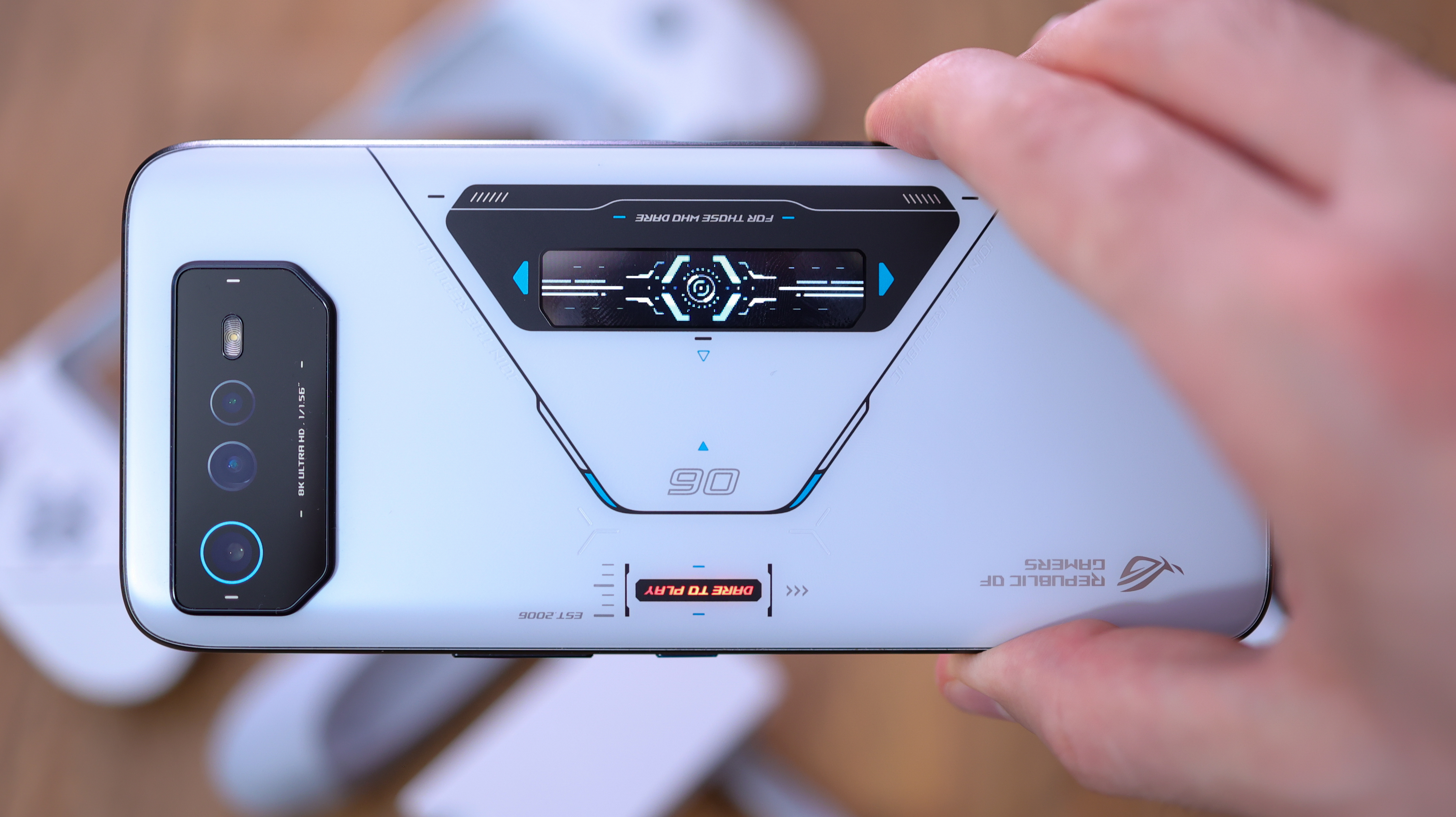
The Asus ROG Phone 6 builds on a winning formula of solid specs, familiar styling, and a well-thought-out accessory line. Its ecosystem is one you can really buy into, and the phone is great in day-to-day use, with loads of smart, gamer-centric customisations and software flourishes. The result: a gaming phone that beats out the competition – and rightly so given the fact it's pricier.
-
+
Best-in-class power
-
+
Impressive battery life
-
+
Smooth and punchy screen
-
+
Excellent accessory suite
-
+
First splash-proof gaming phone
-
-
No wireless charging
-
-
Camera lacks OIS or telephoto lens
-
-
Mediocre macro camera
Why you can trust T3

All smartphones run games, but the Asus ROG Phone 6 on review here is a true gaming phone. It's marked out by a suite of super-powered-armour-style accessories, packs mighty graphics and processing clout, and sports some fierce styling.
An iPhone 13 Pro Max clone this is most certainly not, Asus's ROG Phone series hit the scene in late 2018 with a roar. Since then, it's been refreshed once or twice a year with more power and edgier styling than before, but with the same core formula – the latest internals, the highest refresh-rate screen, and a huge beefy battery.
The ROG Phone formula is going strong in 2022, with all the latest gaming mod cons, as well as much-needed general updates when it comes to imaging and durability. The phone packs the same camera sensor as the excellent Realme GT 2 Pro and OPPO Find X5 Pro. It's also the first IPX4 spash-resistant gaming phone, and enjoys nippy charging speeds.
But with new challengers entering the arena from the likes of Nubia's Red, Lenovo's Legion, and Xiaomi's Blackshark lines, can Asus hold onto its top spot despite such fierce competition?
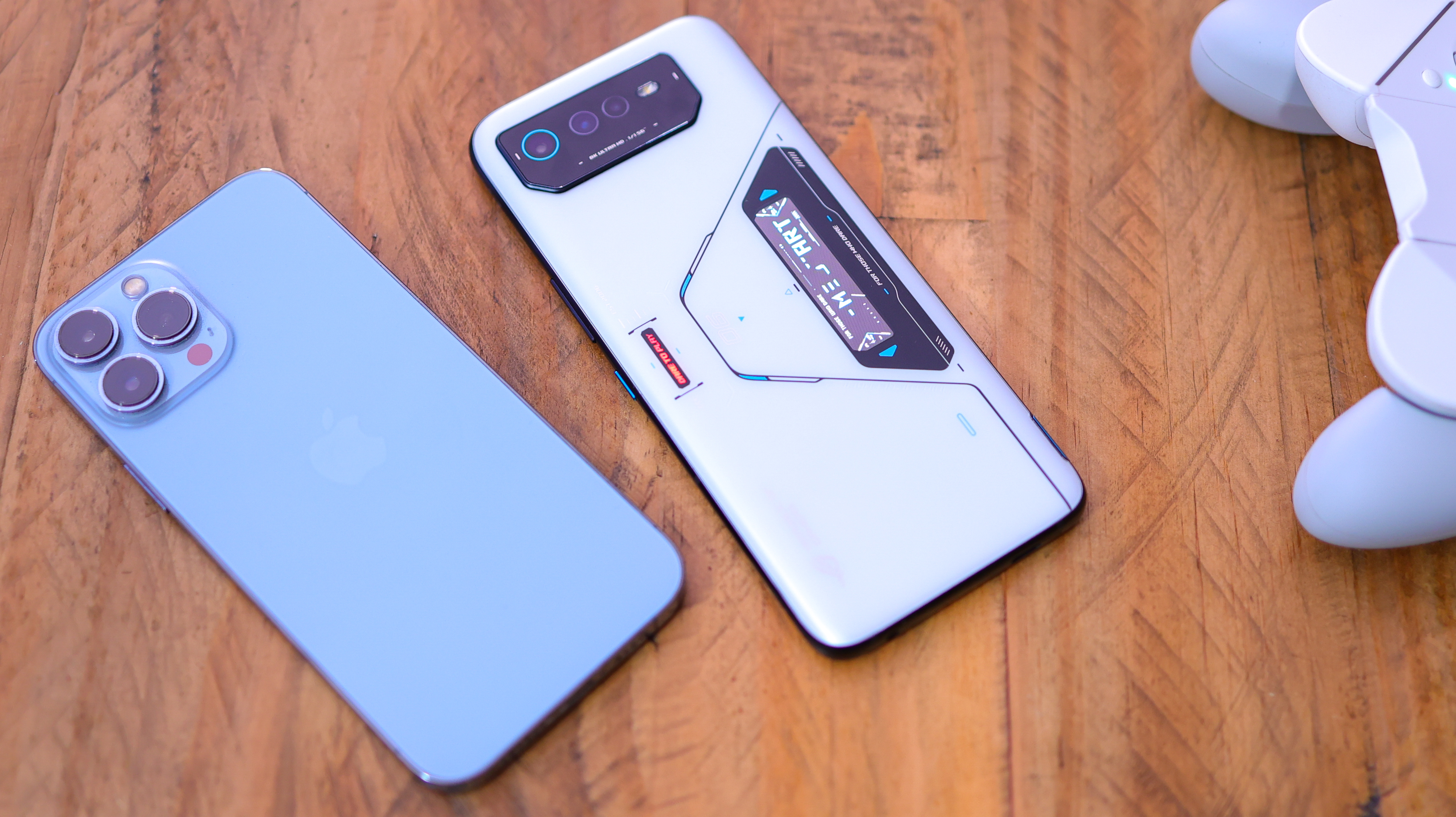
Asus ROG Phone 6 review: Price and availability
Exactly when you can buy the ROG Phone 6 will depend on where you are, but we do know that it has been confirmed for the UK through Asus's online store. The phone will ship in a few flavours and prices, starting with 256GB storage and 12GB RAM (£899) and climbing up to 512GB storage and 16GB RAM (£999).
Asus has also announced a Pro version of the ROG Phone 6, which sports virtually identical specs to the standard device, but adds an LED light around the back and increases the RAM to 18GB (£1,199).
As and when the device becomes available check the widget below for the latest prices in your region:
Asus ROG Phone 6 review: Design and Accessories
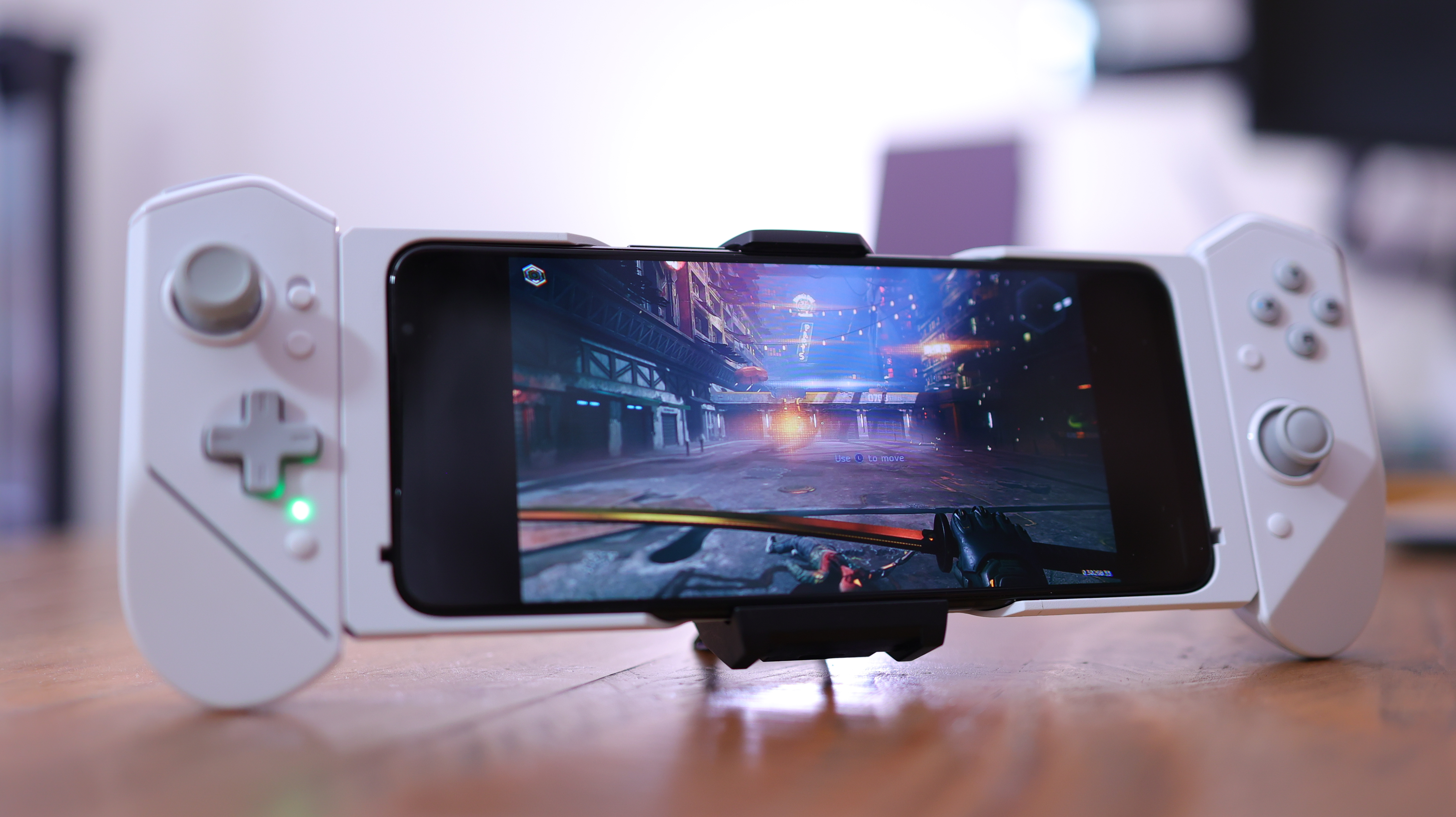
We've seen a lot of black phones over the years, and specifically black ROG Phones, so you can imagine our delight when we clocked a pearlescent matte white phone peeking up at us when we unboxed the handset. It's the first time white has been available on standard, non-Pro, ROG phones.
The phone's back panel is adorned with glyphs and flourishes that smack of sci-fi movie alien mystique. And while the phone doesn't look as angry as past-generation ROG phones, this is still clearly a smartphone styled for gamers.
There's also a ROG Vision screen on the back of the phone. Yep – a screen, on the back of the phone. Named the ROG Vision OLED, this colour display strip dynamically showcases different visuals depending on what you're doing with the phone. So if you're charging it, the strip will display the charging progress. When you're playing a game – the words 'Game Start' light up. It also gives you an insight into your notifications when the phone's face down. This is a lot and is obviously completely unnecessary. That said, it's also a lot of fun, commanding attention and it feels well integrated into the overall design.
Two key design difference differentiate the vanilla from the Pro version. The first, the rear screen, which is at an angle on the standard models, is horizontal (when the phone’s held in landscape) on the 6 Pro. The Pro also has the words ‘dare to play’ backlit for some extra RGB goodness. It’s the version we tested, so is pictured in this review.
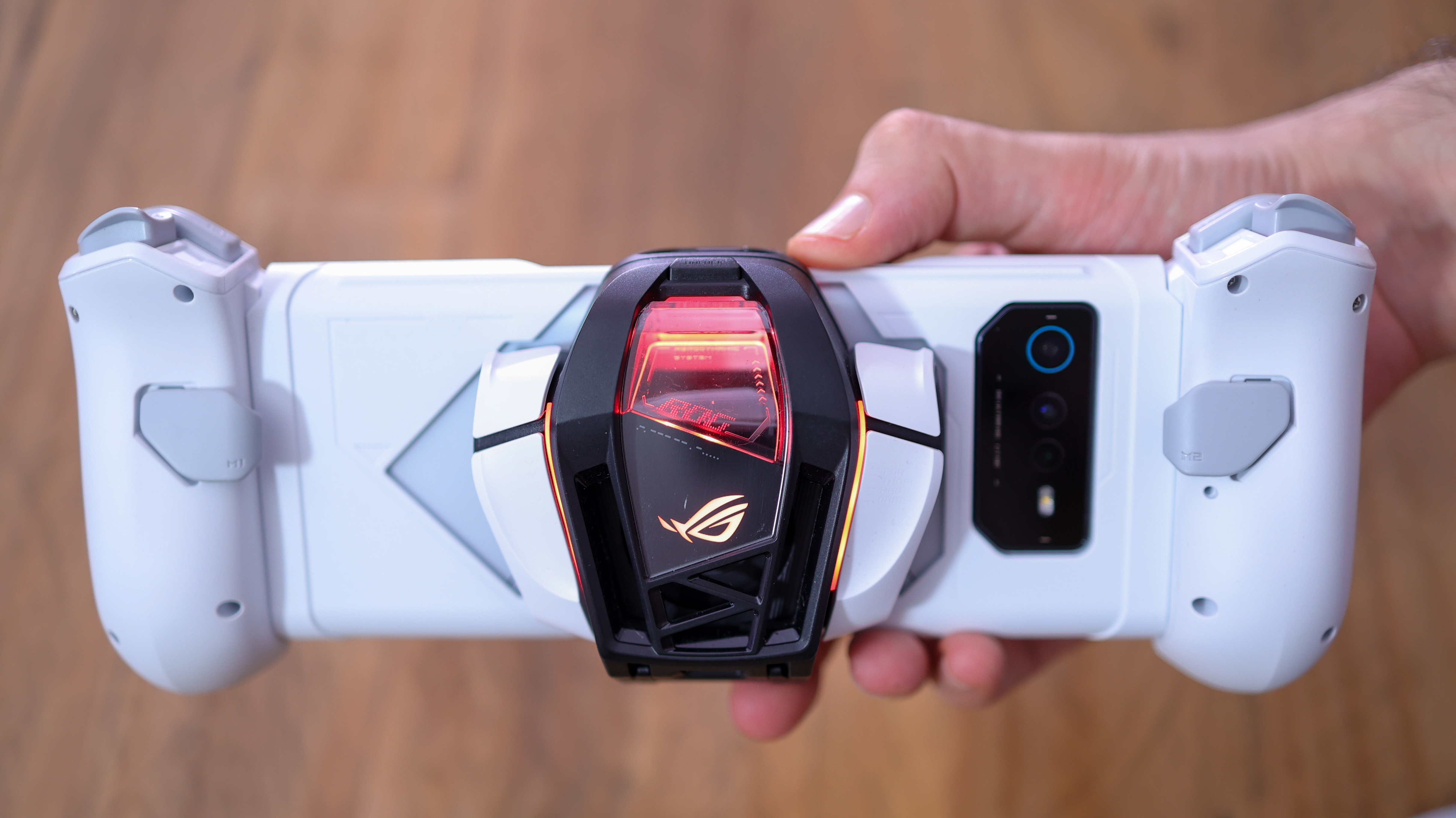
ROG Phone 6 (Pro Edition) next to an iPhone 13 Pro Max
As for ports and buttons: dotted around the curved, matte black metal frame of the ROG Phone 6 are two USB-C ports, one on the base and another on the left side. This is so you can charge your phone while playing comfortably, or while it's plugged into an accessory. All the buttons are on the right side (screen facing) – volume, power, and two touch-sensitive shoulder buttons for gaming. There's also a 3.5mm headphone jack too, if you're still into using the best wired headphones.
The front of the ROG Phone 6 is mainly screen. Above and below, you'll find the front 12MP camera and stereo speakers. As for the back, there's a triple camera system in addition to the visual flourishes we've already mentioned.
Weighing 239g, the ROG Phone 6 is one of the heaviest phones we've tested. By comparison, the Honor Magic 4 Pro is 215g, and it's only beaten by the iPhone 13 Pro Max, which weighs 240g. With its curved sides and tall form, the ROG Phone still manages to avoid feeling totally inelegant, despite its heft and thick 10.3mm depth.
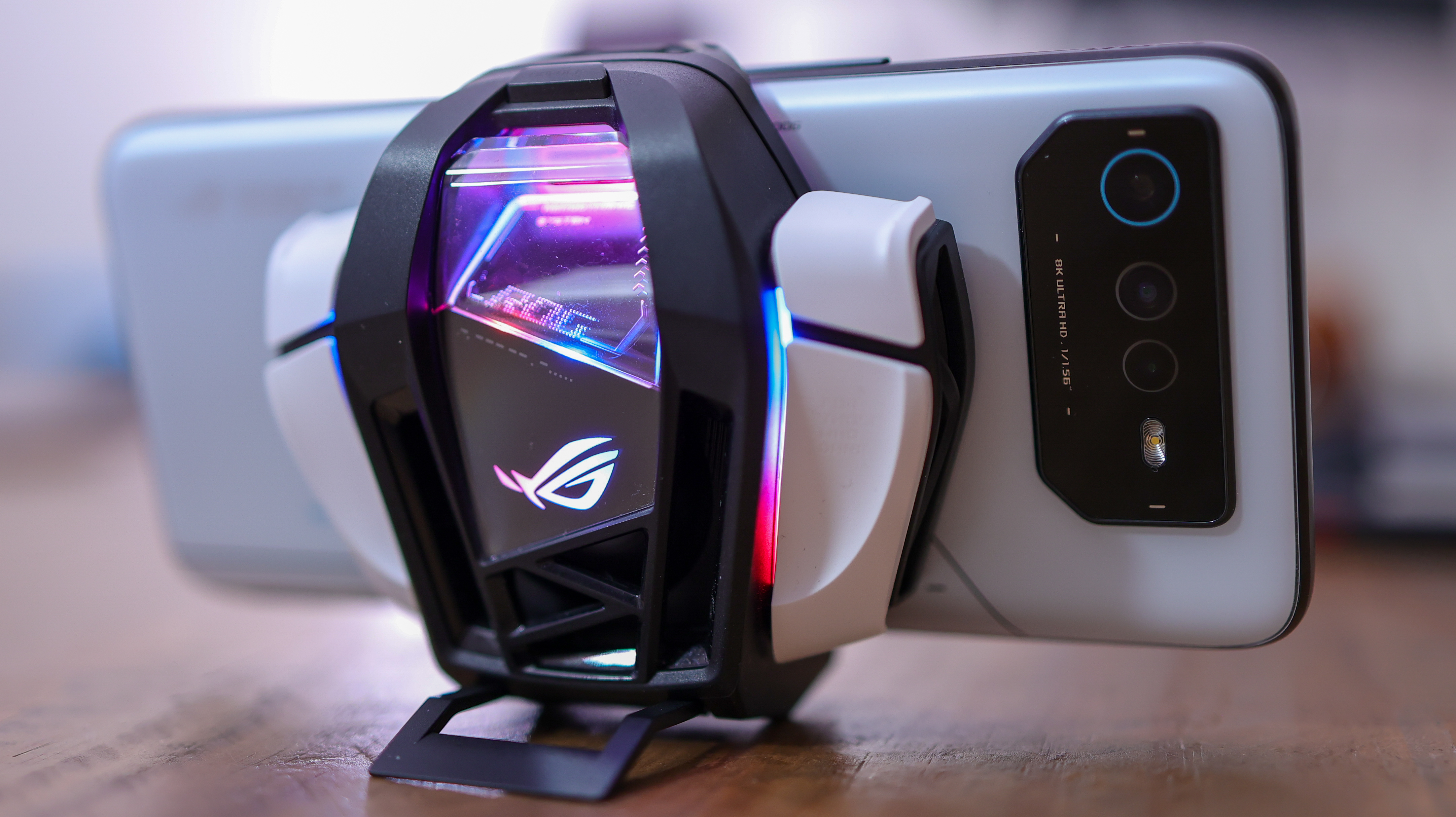
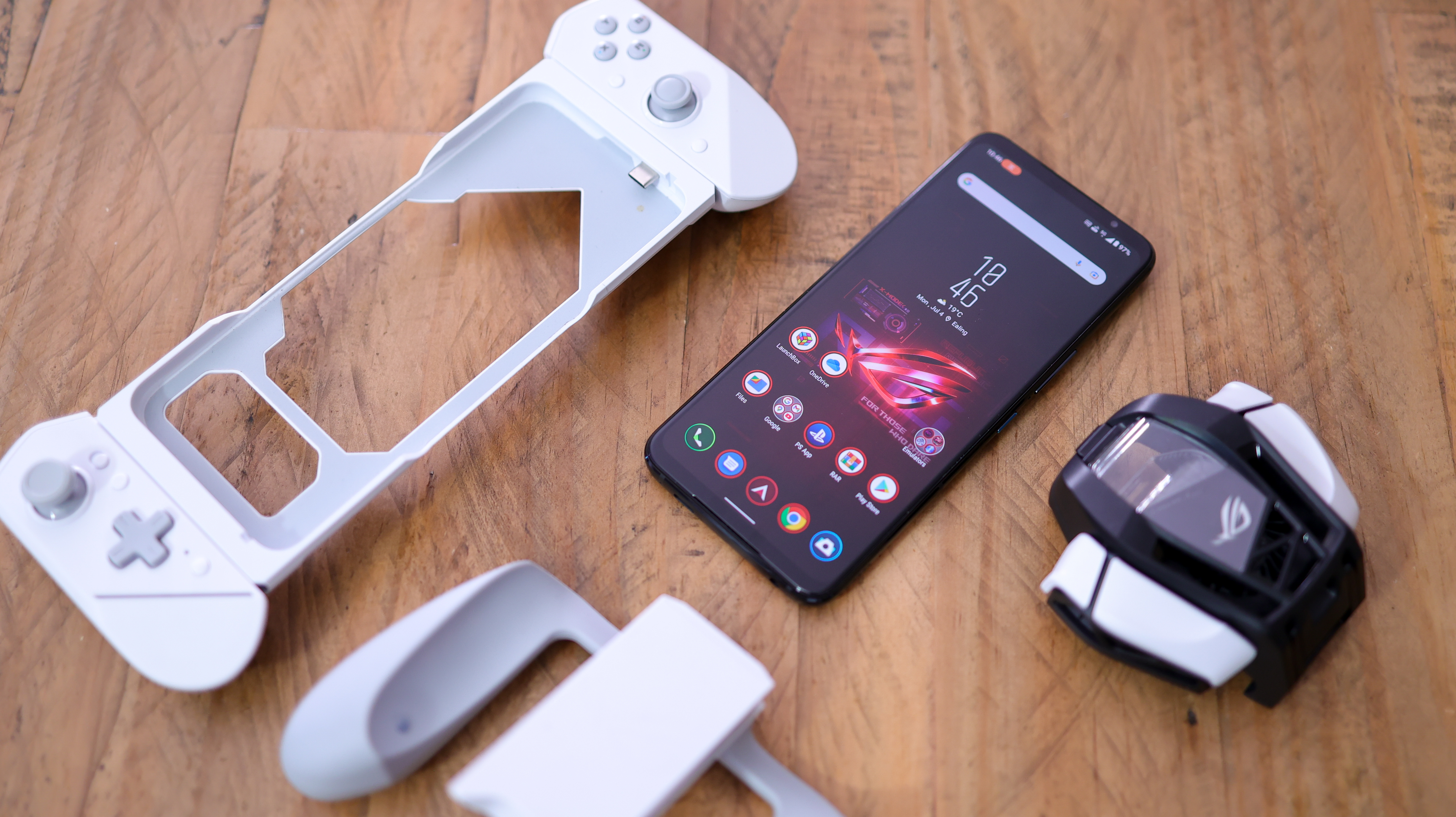
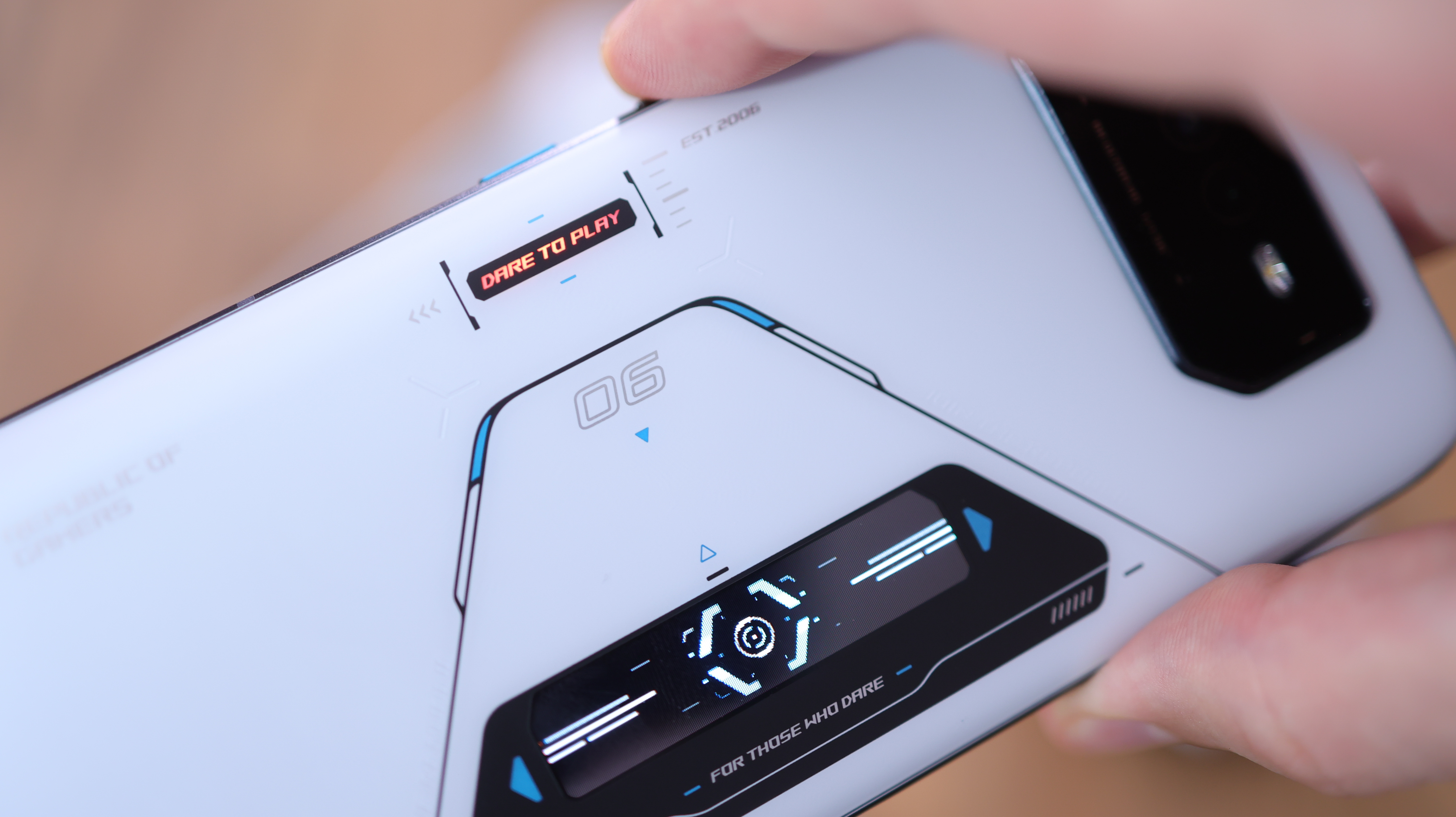
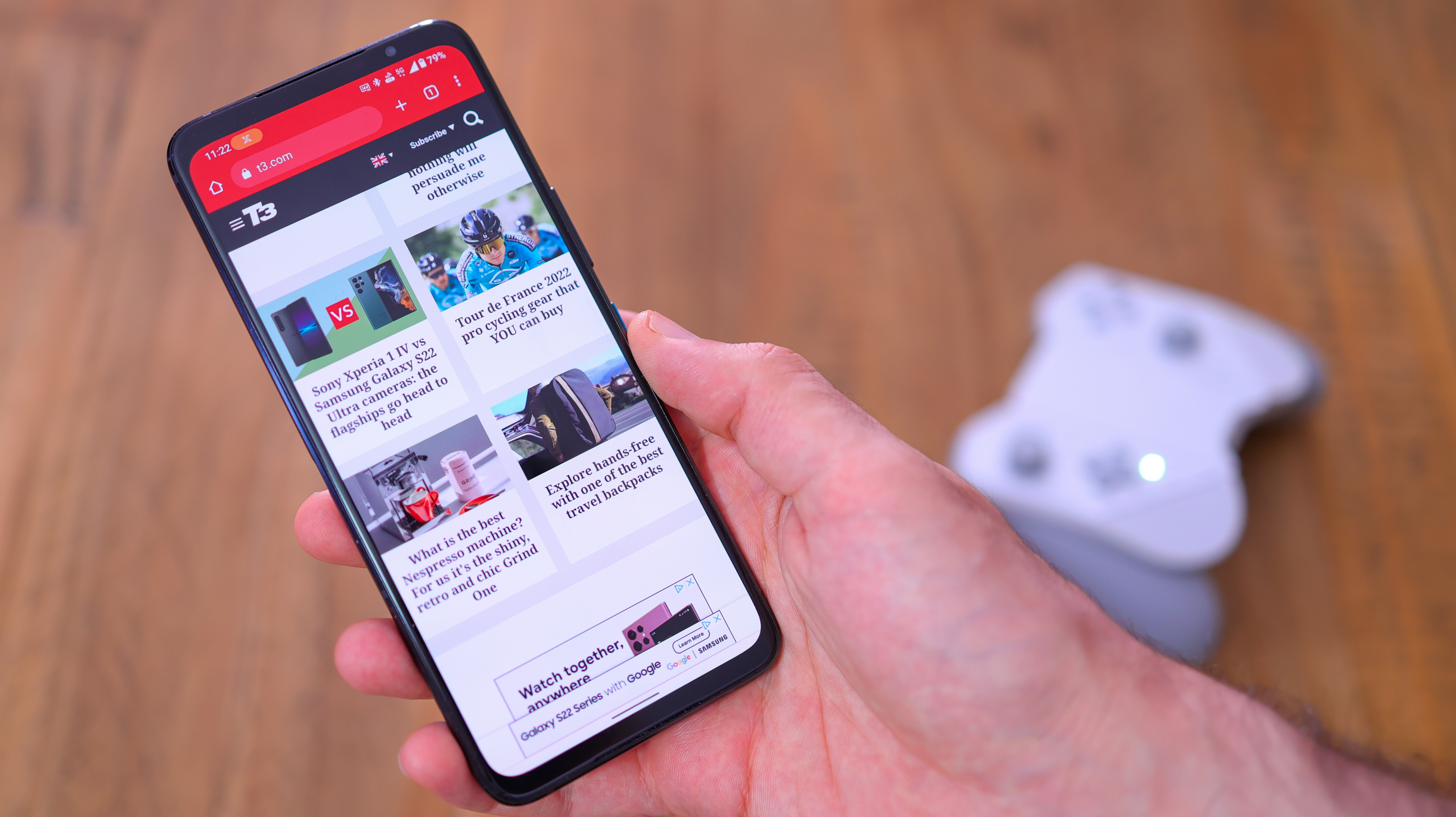
Asus' eccentric gaming accessories have always helped the brand stand out, and there's no shortage of add-ons to turbo-charge the ROG Phone 6. We tested the new AeroActive Cooler 6 and the updated ROG Kunai 3 Gamepad (pricing on both to be confirmed), and you can also pick up a clip to hook the phone up to a gamepad, a USB-C dock, and a slew of cases to match your style.
The AeroActive Cooler 6, pictured above, is an absolute RGB-flashing beast that clips onto the phone, plugging into the USB-C port in the process. This sports three levels of fan power, as well as a cooling element mode.
What made a bigger difference to our time with the phone was the Kunai Gamepad. This set of Joy-Con clones works as a standalone gamepad using Bluetooth, or clips onto a dedicated ROG Phone 6 case for handheld console ergonomics. This versatility (and Asus' genius gaming software) edges the Kunai Gamepad ahead of competing gamepads like the Razr Kishi, even though when gaming we found the d-pad to be a bit stiff.
Asus ROG Phone 6 review: Display
With a 6.78-inch Full HD AMOLED display, on first impression, the ROG Phone 6 sports the same screen as its predecessor. However, dip into the settings and you'll see the option to whack its refresh rate up to 165Hz – matching the reigning refresh rate champ, the Red Magic 7.
The Samsung-made AMOLED panel also has a touch-sampling rate of 720Hz, which means you can expect fantastic responsiveness, whether gaming, typing, or swiping through sites or feeds.
The screen gets nice and bright at 800 nits in standard mode, peaking at 1200 nits when the adaptive mode is active. This means outdoor viewing is easy even in bright sunlight, though be sure to fire up auto brightness if you struggle to see what's on-screen – 800 nits falls short of being bright enough for the sunniest climes.
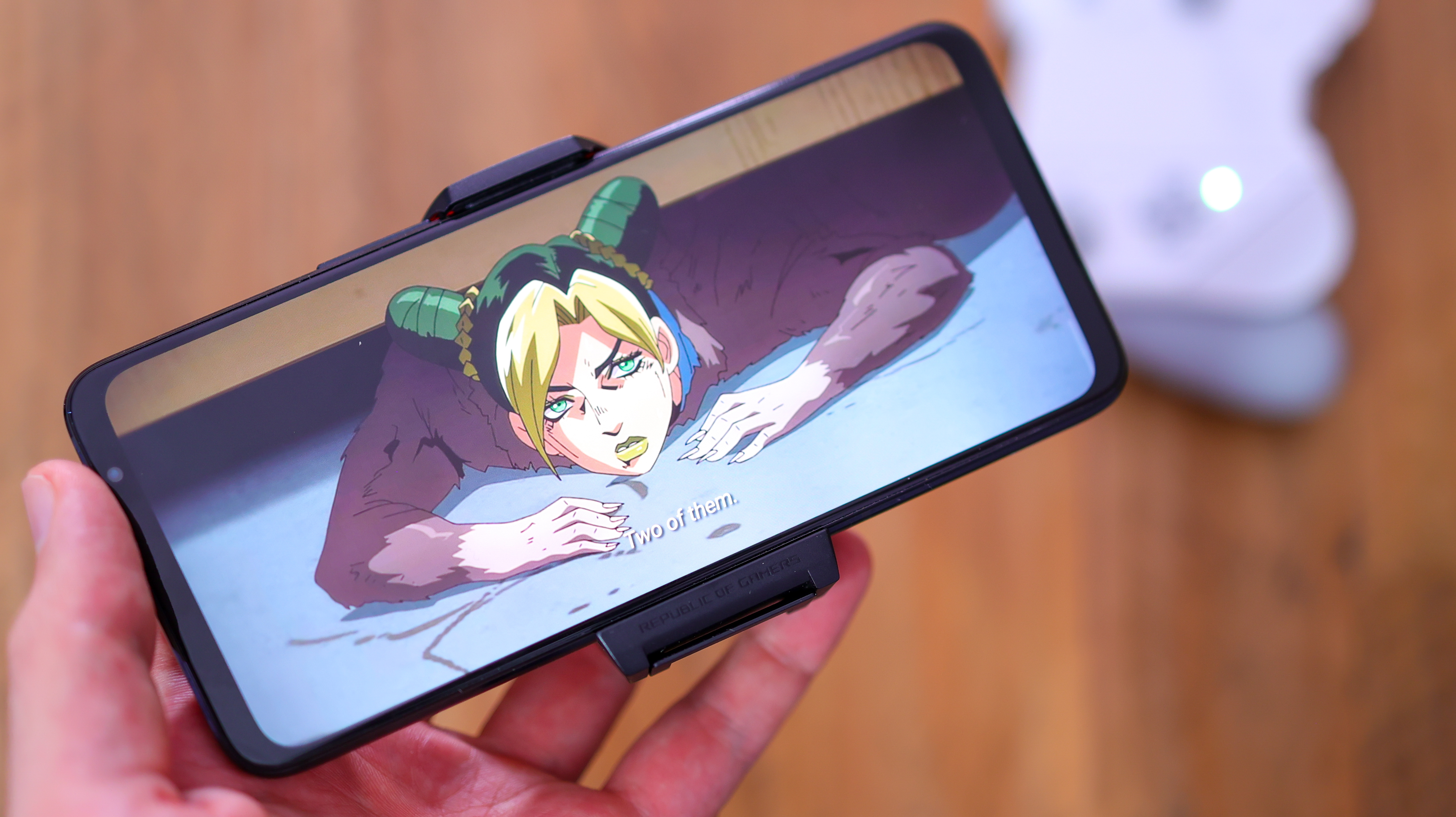
Far from being the sharpest screen on the block, with its 2448 x 1080 resolution, the phone's clarity falls behind the likes of the iPhone 13 Pro and Samsung Galaxy S22 Ultra. Nevertheless, class-leading sharpness on a gaming phone isn't a huge deal as most games output at 1080p anyway. What the ROG Phone 6 does do is offer punchy, saturated and accurate colours with great contrast and plenty of viewing mode customisations in the settings.
Around the screen, especially at the top and bottom, there's more bezel than we're used to seeing from flagship devices these days. This is compounded by the fact the screen is flat, so doesn't feel as special as curved displays like that of the OnePlus 10 Pro. That said, all this makes sense from a gaming point of view, and the ROG Phone 6's design and screen succeed at making it comfortable to game on for hours without accidental mistouches.
Asus ROG Phone 6 review: Cameras
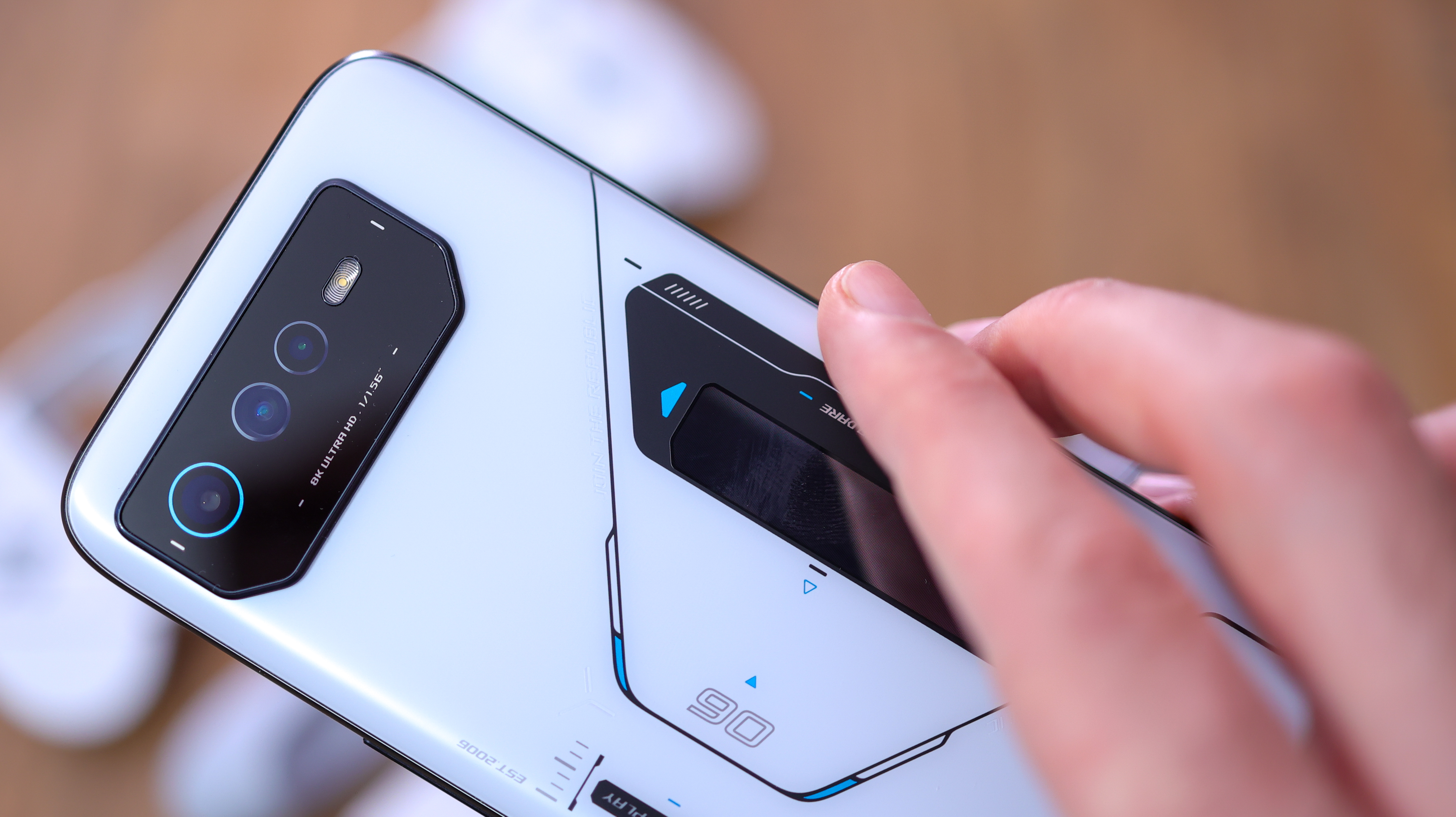
While gaming phones never had iPhone- or Pixel-beating cameras, the ROG Phone series has always put on a respectable showing. This time around, we get an upgraded main camera, even though there's a downgrade in pixel count.
The ROG Phone's main camera is a 50-megapixel sensor (Sony IMX766) with an f/1.9 lens. It's flanked by a 13MP ultra-wide camera and a 5MP macro camera – both returning from the previous ROG Phone 5.
Asus also includes 8K video recording at up to 24fps, as well as 120fps 4K capture from the main camera, so it's nice and competitive on the video specs front.


When it comes to photo and video quality, we're pleased but not blown away by the results.
Photos taken on the ROG Phone 6 pack a healthy amount of contrast – but at times too much. They're also heavily sharpened and while this looks great in some scenes, photo purists will appreciate a more dialled-back approach to in-camera processing.
If you're not a photo purist though, the ROG Phone 6's new main sensor implementation gives you loads of detail and supremely Instagram-ready shots.
The lack of optical image stabilisation (OIS) holds the phone back in dimly lit scenes. When the lights drop past a certain point, the ROG Phone 6 fires up night mode though, and as you can see from the samples below, this works well at pulling out extra detail. When lighting is fair but not great this mode doesn't automatically activate, though, and photos can look soft unless taken with a rock-steady hand.




It's great to see the ultra-wide take advantage of Asus' night mode, and the results are improved versus the ROG Phone 5 despite the hardware being the same. In well-lit scenes, it captures a good amount of detail, albeit soft at the side, and in dark conditions the night mode saves it from mediocrity.
We're also impressed with video capture. Despite the lack of OIS, the phone held footage together steadily up to 4K resolution at 60fps. The microphones also capture decent sound, while the camera main camera is quick to focus.
While Asus' ROG Phone 6 definitely isn't the best camera phone, it has the best camera of any gaming phone we've tested, despite its mediocre macro camera, which should be overlooked in favour of the main camera in all but the brightest scenes.
Also a pleasant surprise is the improved selfie camera, which captures 12MP photos with detail and nuance.
Asus ROG Phone 6 review: Performance
Gaming and general performance are where you'd expect the ROG Phone 6 to shine, and shine it does – literally and figuratively.
The phone introduces the Qualcomm Snapdragon 8+ Gen 1 chipset, so has more power available than any other Android phone right now. The version we tested also benefits from 18GB RAM and 512GB storage, but those specs are just the tip of this pearlesque Storm White iceberg.
Starting with the hardware: Asus has moved things around, so the processor isn't near the edge of the phone. You might notice your current phone tends to get hot around the camera when it's under pressure – as that's where the brains are usually put. But to keep things cooler, Asus has shifted the processor to the centre. This also moves the warmest point further away from your hands (and the metal frame). Phones like the Xiaomi 12 Pro got very warm after minutes of gaming. The ROG Phone 6, however, is much better at keeping its cool – and that's without any fan accessories.
Asus has also added other considered touches to manage heat. Charging phones generally heats them up, but you can set the ROG Phone 6 to only draw enough power to stay alive, so you don't have to worry about an empty battery or heat hampering your handheld gaming.


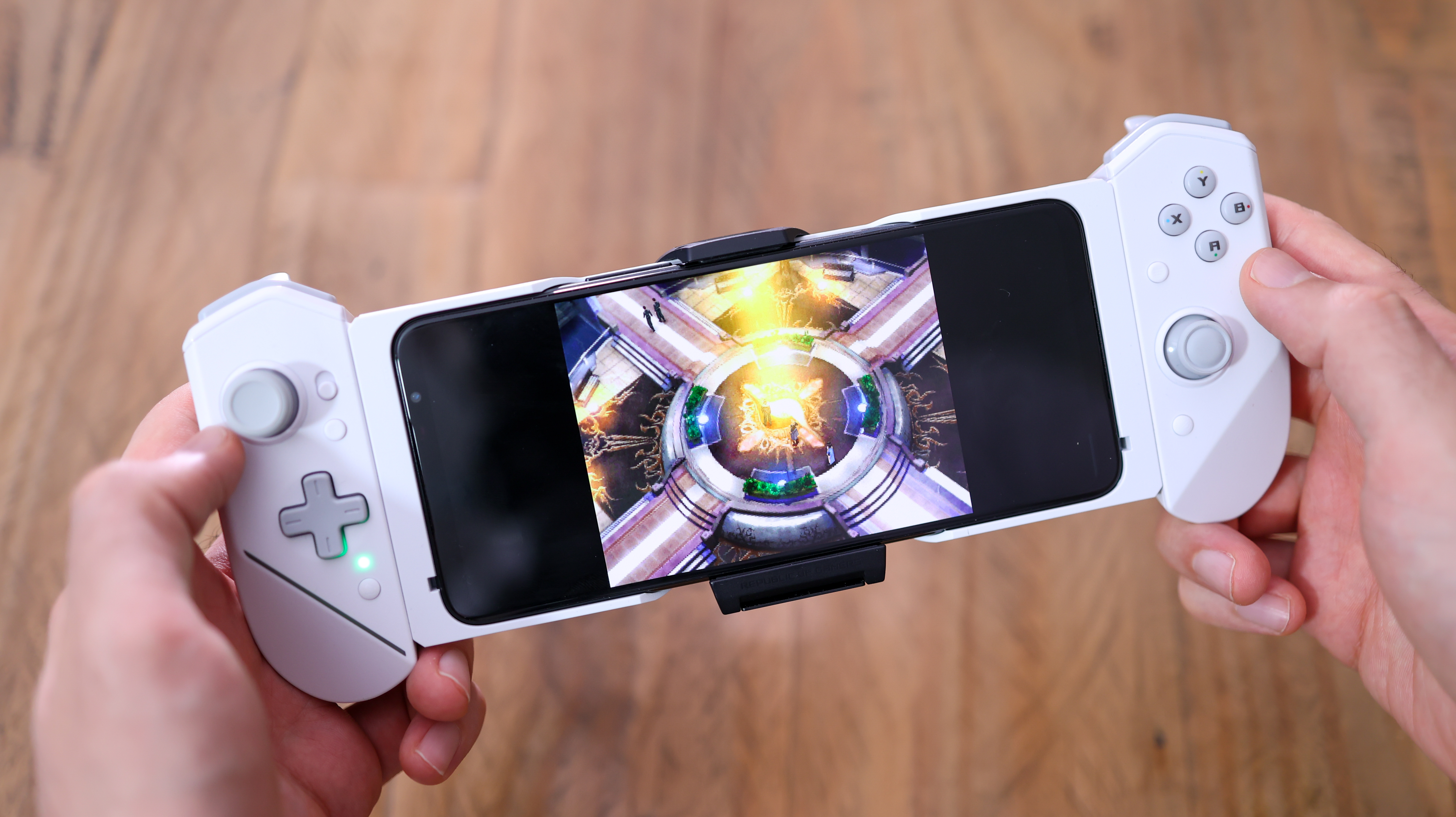
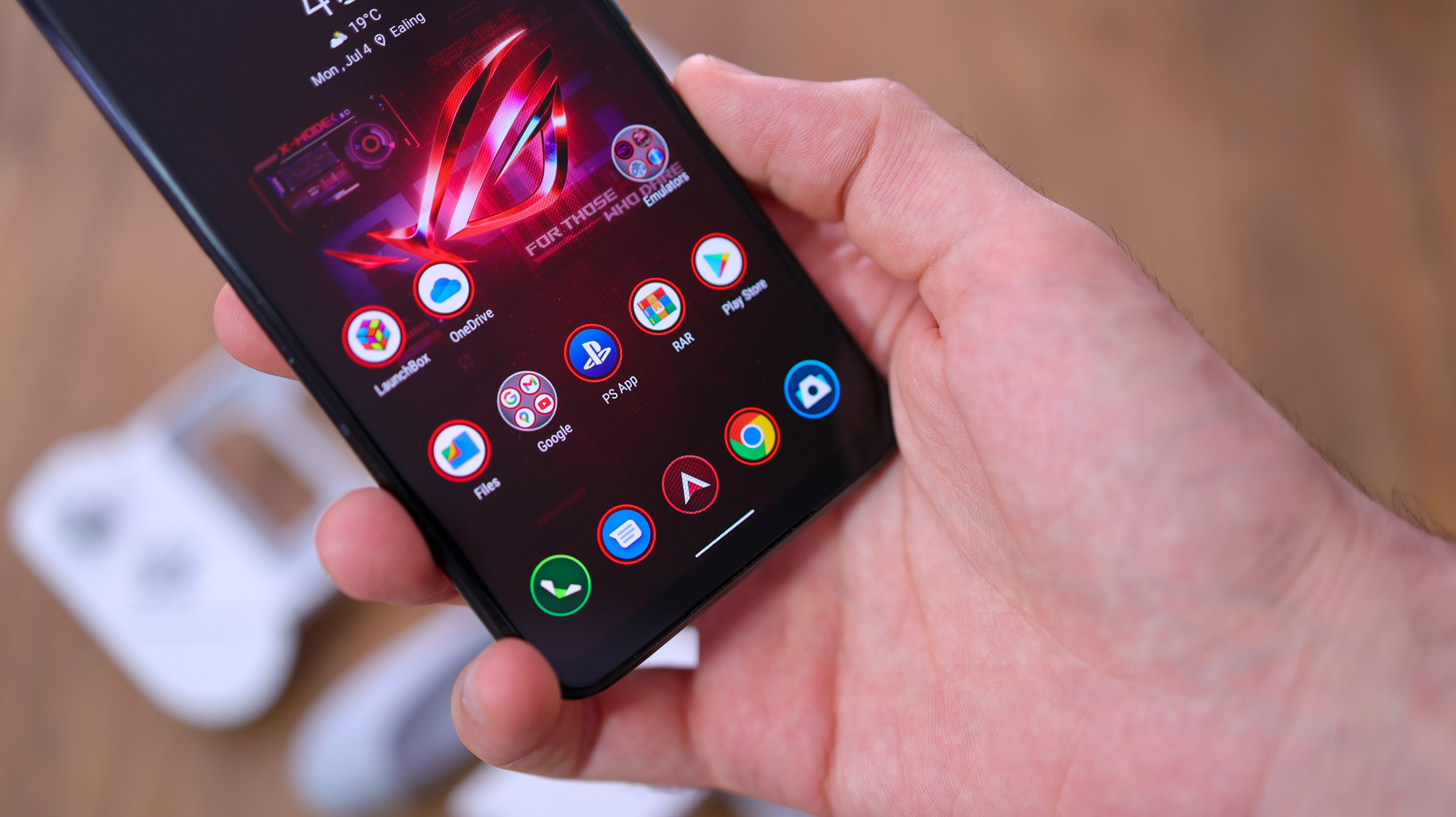
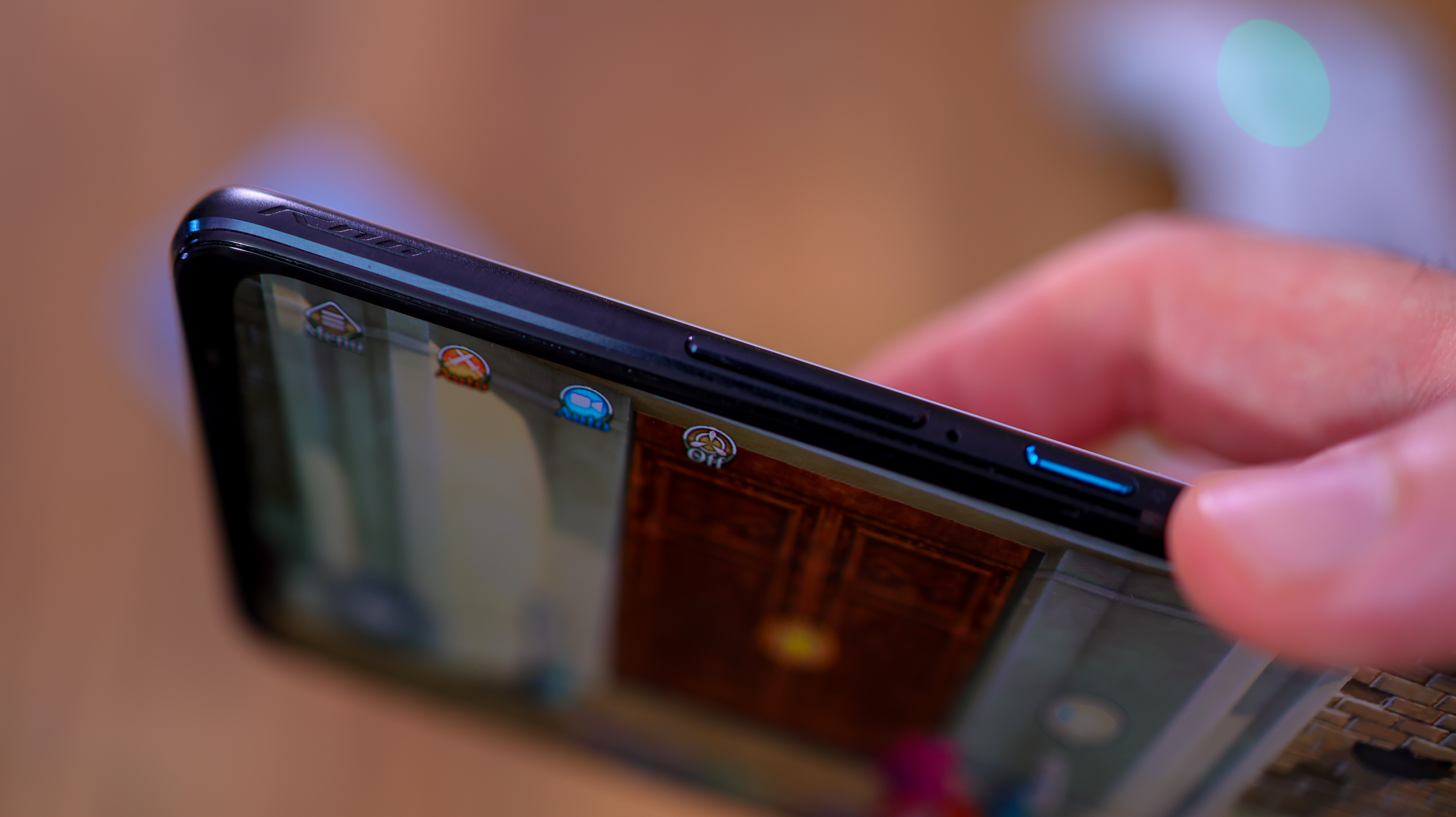
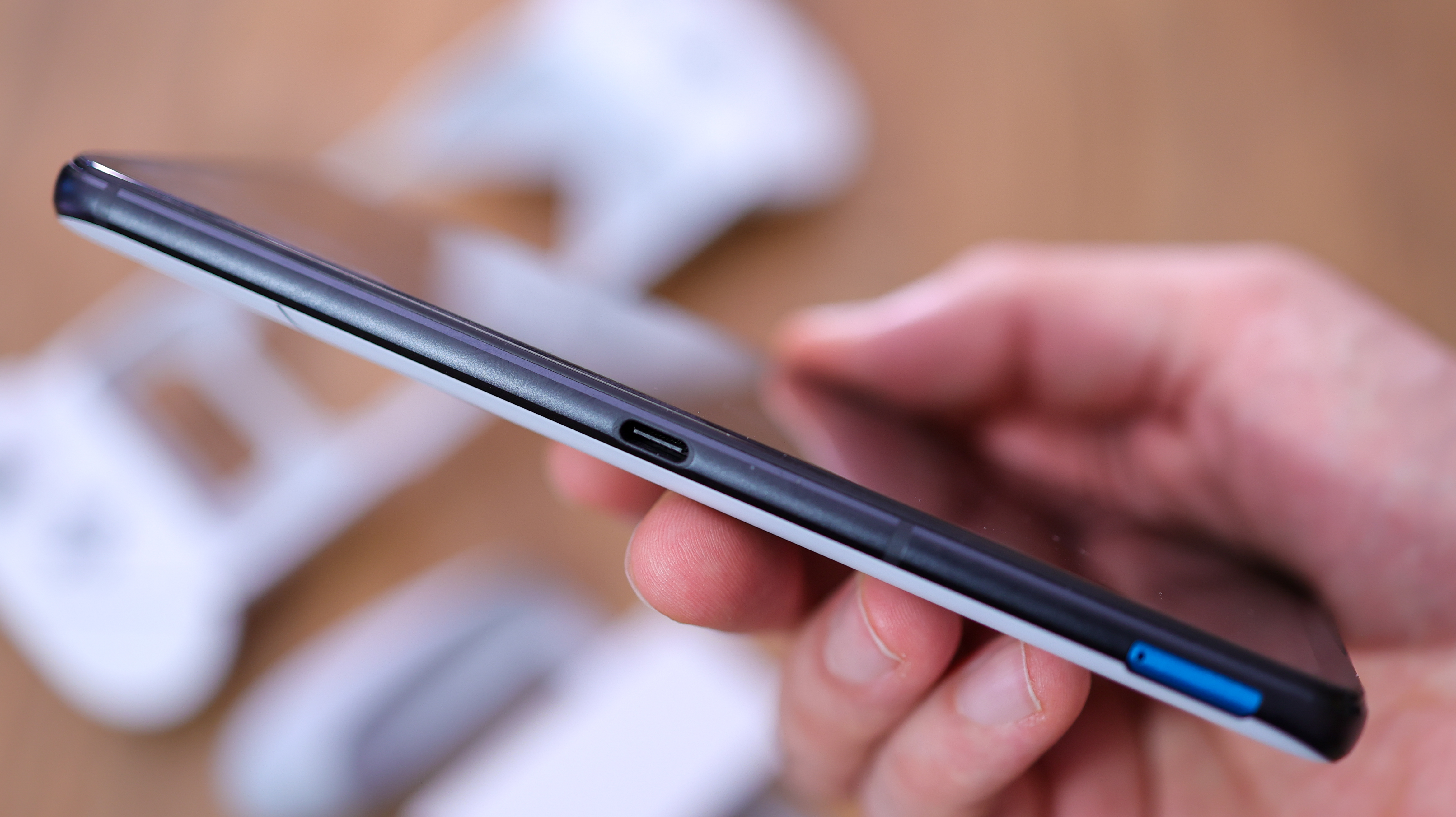
As for gaming with the phone, it's an absolute joy in most areas. While many older games we play have 4:3 aspect ratios, and look squished on the ROG Phone 6 with hefty black borders, optimised mobile games like Genshin Impact and Trials of Mana look exceptional.
Game Genie, Asus' gaming portal, does a great job of giving you control over your accessories, spoon-feeding you games that can take advantage of the 165Hz display, and adding more in-game options than any gaming tool around.
Asus also includes a WiFi/cellular aggregator feature, so it can pull from multiple WiFi networks and a 5G signal to hit the fastest data speeds possible. When streaming games like Ghostrunner on Nvidia's GeForce Now, this is priceless, making it the best phone for cloud gaming we've tested.
The phone's L and R touch triggers have also been smartened up this time around. They support taps, swipes left or right, and can even be horizontally partitioned, acting as two inputs – L1 and L2, for example. Need more inputs? Use the gyroscope and shake the phone, and if you have a controller, then you can map it to your game using Asus' Game Genie software.

Biometric security comes in the form of a responsive under-display fingerprint scanner as well as basic face recognition that takes advantage of the front camera.
With speakers on either side of the screen, the ROG Phone 6 is loud, and delivers impressive sound separation for a phone, with iPhone-beating volume, even though it can't best Apple's Pro Max line when it comes to rounded, balanced depth.
Running Android 12 with Asus's ZenUI over the top, the out-of-the-box interface is inevitably gamer-focused. There are a lot of fun, rich themes with either a cyberpunk- or anime-like styling, you can also dial back the va-va-voom and switch the interface to a more stock take on Android if you want. Turn off the LED lights around the back and stick the phone in a case, and the ROG phone can go from a gaming phone to a generic phone in a flash.
As for benchmarks, the ROG Phone 6 bests the rest, with everything from its storage read and write speeds, to graphics beating every Android phone out now across 3D Mark, Geekbench and PC Mark benchmarking apps.
Asus ROG Phone 6 review: Battery and charging
With its 6,000mAh battery, Asus' ROG Phone 6 enjoys one of the biggest batteries on the block. The standard capacity these days is 4,500-5,000mAh for Android phones.
While there's no wireless charging, the ROG Phone 6 does power up quickly with 65W charging, taking it from 0-100 per cent in around 45 minutes.
As for how long the battery lasts, that really does depend on how you spend your day. If you're using the ROG Phone 6 as a phone, it'll last for ages, draining just 80 per cent after a little over 16 hours with the screen on. This is Oppo Find X5-grade longevity, and it's exceptional.
Gaming and the phone's high-performance X-Mode do zap the battery faster, unsurprisingly, and if you use either a fan or the Kunai Gamepad with the clip-on case, expect significant reductions. Nevertheless, we were never caught short with the ROG Phone 6, making from morning to night with over 30 per cent left in the tank on all but the heaviest testing and gaming days.
Asus ROG Phone 6 review: Verdict

The ROG Phone 6 isn't the best phone of 2022, but it is the best gaming phone we've tested. While the competition is tough, the alternatives lack the refinement Asus brings to the table.
You could argue that Asus has played it safe. From the front, the ROG Phone 6 looks identical to the ROG Phone 5 and 5s, and we would like to see Asus shake things up even more. That said, the phone does the job with a greater degree of polish, and a richer suite of accessories than alternatives like the Red Magic 7 and Poco F4 GT.
Could the ROG Phone 6 be better? Absolutely. We'd have loved wireless charging, optical stabilisation (OIS) on the main camera, and better secondary cameras. Having said that, its gaming enhancements are standout and unique, so this may not matter to its key audience.
So while it's niche and expensive, the ROG Phone 6 still manages a nearly flawless victory over the gaming phone competition.
Asus ROG Phone 6: Also consider
Want to spend a little less on your next smartphone? While the Red Magic 7 series isn't as refined, it is a more affordable gaming phone alternative. Alternatively, the Poco F4 GT is a great shout with its physical shoulder buttons.
Not sure you need a gaming phone? You can get a better camera experience in the Google Pixel 6 Pro, and it will run most of the latest games well. Alternatively, the Realme GT 2 Pro has loads of power, great heat management and a flat-screen, while undercutting the ROG Phone 6.
If you're wondering how we test our phones here at T3 – or indeed any gadgets, and believe us, we do cover an awful lot – then head over to our How We Test page for the full lowdown on our process and ethics.
Sign up to the T3 newsletter for smarter living straight to your inbox
Get all the latest news, reviews, deals and buying guides on gorgeous tech, home and active products from the T3 experts

Basil has been writing about tech for over 12 years, with bylines in TechRadar, Metro, Wired, and Digital Camera World – to name but a few titles. He expertly covers everything from mobile phones to smart devices, cameras, audio-visual hardware, and kitchen tech. In addition to his extensive journalism experience, Basil is also skilled in video production, content strategy, and vegan baking, and runs Tech[edit], a technology-focused YouTube channel.
-
 Smeg adds a touch of navy sophistication to its iconic breakfast set
Smeg adds a touch of navy sophistication to its iconic breakfast setIt's a minimalist's dream
By Lizzie Wilmot Published
-
 My most anticipated Netflix movie of the year gets a wild new trailer
My most anticipated Netflix movie of the year gets a wild new trailerHavoc looks pretty unbelievable
By Max Freeman-Mills Published
-
 Forget the tariffs, Paddington 3 is now on Netflix to bring you joy
Forget the tariffs, Paddington 3 is now on Netflix to bring you joyPaddington In Peru is now streaming on Netflix
By Mike Lowe Published